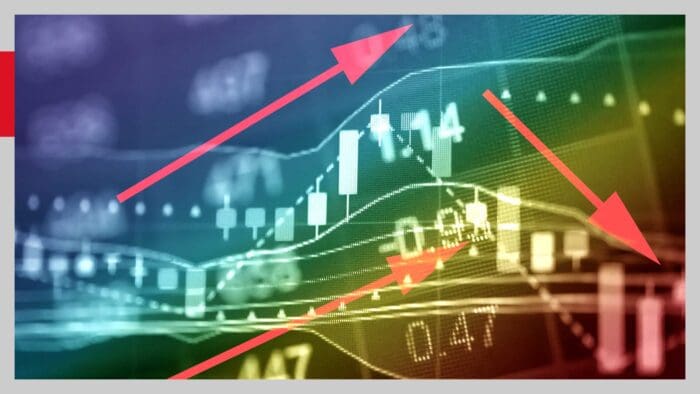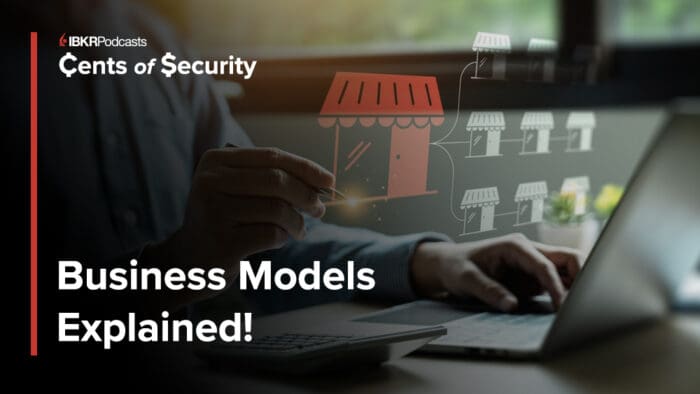You may have heard of macroeconomics vs microeconomics. These foundational topics are crucial to understand in the field of Economics. Also, they play an important role if you are making decisions based on economic trends. Jose Torres, Interactive Brokers’ Senior Economist joins Cassidy Clement, Senior Manager of SEO and Content to discuss.
Summary – Cents of Security Podcasts Ep. 46
The following is a summary of a live audio recording and may contain errors in spelling or grammar. Although IBKR has edited for clarity no material changes have been made.
Cassidy Clement
Welcome back to the Cents of Security podcast. I’m Cassidy Clement, Senior Manager of SEO and Content at Interactive Brokers. Today, I’m your host for our podcast and our guest is Jose Torres, IBKR’s Senior Economist.
You may have heard of macro and microeconomics, and these foundational topics are crucial to understand in the field of economics. But they also play an important role if you are making decisions based on economic trends. So today we’re going to explore these two topics. Welcome back to the program, Jose.
Jose Torres
Hi Cassidy, great to be here.
Cassidy Clement
So to kick this off a little bit more fun, because you’ve been on this podcast several times before. Normally I’d ask hey, what’s your industry background to kind of give people an idea of what lens you’re seeing things through.
But for this one, I’m kind of interested, since you’re an economist, when did your first interest or spark happened when it came to econ. When did you first take an interest or was there something particular that really was like oo, that seems interesting to me. I want to learn more.
Jose Torres
From a really young age I was submerged into political topics by my family, who immigrated from Cuba, and I was always fascinated with the interconnections between politics and economics.
And then somehow along that road I found markets. I really became interested in markets and investing and in the possibilities of planning and investing and analyzing different political and economic thoughts and concepts to then make investment decisions.
And then, as I got older in high school, college, I started to see wow, you know, I can actually make this a career if I get really good at math. And I was a good math student and that whole framework really helped me become an economist which I’ve been for around nine years now.
Cassidy Clement
Well, they’re interesting points because a lot of people don’t think about how you’re exposed to economics day to day or even more so how young you get exposed to them. Sometimes, at least speaking for my millennial self, there were a lot of video games growing up that kind of mimicked how economics work, or at least generally. Whether it’s like a world building game or trying to figure out how to build a certain thing with a certain amount of money that you have for the demand that’s in the area.
With that, why don’t we lead into some of the basics here? So with macroeconomics, what is it and are there some examples that you can give to make it easy to understand?
Jose Torres
One thing comes to mind with the point you made earlier. I used to play Monopoly with a neighbor of mine who went to Columbia Business School and was an executive at a large telecommunications company and that really resonates with me, the games and stuff. And you know, how can you move around and strategically build assets and which assets offer the most cash flow now versus which ones perhaps don’t offer much yield today, but in a year or five years from now could deliver exceptional returns, you know? So those kinds of concepts I found in Monopoly.
Okay, so now let’s go to your question. Macroeconomics. So macroeconomics pretty much talks about broad measures of economic performance. And the top measure is gross domestic product, which pretty much tells you how much economic activity is going on.
So you could think about economic activity like traffic. The more traffic there is, the better it is from an economic standpoint, right? And traffic in this sense are transactions. So to what extent are consumers buying goods and services? And to what extent does that drive corporations to produce more goods and services? The more that happens, the wealthier nation becomes and the stronger economic profile that it has. With macroeconomics, of course, and that whole dynamic of corporations producing goods and services and consumers purchasing them, we then get into other measures such as employment and inflation.
So the idea is that you can have all these transactions done efficiently with corporations competing against one another to drive the prices of their goods and services lower on a quality adjusted basis, while also producing new goods and services, ideally at friendly costs.
So that consumers can, with the same amount of hours that they worked, they can now purchase higher quality goods and services down the line. That’s how economic growth has been.
Perfect example. 20,30,40 years ago a lot of folks didn’t have cell phones. Barely anybody had a cell phone, right? Now, everybody has, almost everyone, rather, has the freshest cell phone. The newest cell phone on the market, right? Whether you’re a person who just started working as a cashier at a department store versus a top executive at a company. They literally, in many cases, have the same exact phone, and the reason that is because the macro-economic growth that’s occurred internationally has been staggering in the last 30 to 40 years. Where all folks in different socioeconomic cohorts can afford higher quality items relative to the past.
So the idea is can that continue for the next 10, 20, 30, 40 years? Against that backdrop, can corporations offer most of the population employment so that they can earn wages and continue their trends of consumption and grow them, right.? So those are some of the components of macroeconomics, generally speaking. Economic activity, prices and employment.
Of course, some factors that also influence those variables are the Central Bank, in the U.S., the Fed. And the Treasury, which is the fiscal authority. The Central Bank, by increasing or lowering interest rates, by buying or selling bonds, by changing reserve ratios and changing how the banking system works, they can stimulate an economy if they feel that it’s underperforming.
And then if it’s below the inflation target of 2%, they can stimulate. Or they can try to slow it down with restrictive monetary policy, which involves higher interest rates, typically lowering balance sheets, getting rid of bonds, typically raising reserve ratios, and fostering a lending environment that’s more restrictive rather than more accommodative and expansive.
On the fiscal side, pretty similar just through a different category and essentially how much do you want to tax, right? So if you tax a lot, you’ll have more money coming in up until that point where you start to destroy the incentive of working people and working companies, right? And that’s one important aspect- tax.
And an important consideration there, Cassidy, is if the government wanted to collect as much money as possible, what tax rate would yield the most tax receipts? You might think well, how about 100%?
We’ll just take everyone’s income away and give it to the government. Well, if you do that, a lot of people will just drop their productivity and have zero income. Because they won’t have an incentive to go out and earn income. So taxes, of course, is an important policy. You want to have that delicate balance where you have enough entrepreneurship going on, you have enough incentive for people and corporations out there, while also bringing in a decent amount of funds to cover federal expenditures in the U.S.’s case.
Then the next question for the fiscal authorities is how much do you want to spend, right? If you spend a lot that’s accommodative for the economy. If you spend less, that’s more of a restrictive stance. Some of those factors are the most important when it comes to macroeconomics.
Cassidy Clement
In some of the explanations that you had given, you had mentioned GDP, inflation, monetary and fiscal policy. How exactly are the day-to-day investors seeing these macroeconomic impacts? Base level, of course, you could say, well, all of those and impact your life in so many different ways and really, as an investor, of course, they’re all going to impact your investments, like asset prices.
But is there a certain item or thing that gets impacted one over another? How exactly would somebody see this?
Jose Torres
Post pandemic, we moved into a very macro themed market. This year not so much. We’re sort of turning the page away from macro, but during the period between 2021 and the end of 2023, so much focus was on what’s the Fed going to do? How much are they going to increase interest rates, right? And how much liquidity are they going to constrain from the market?
And those dynamics really affected stocks strongly because in 2020-2021, there was a thought that the Fed would leave rates at zero and be very accommodative for a long period of time. They didn’t expect inflation to come around.
But then when inflation did come around, late ‘21, early 22, then asset prices were very vulnerable to any kind of restrictive rhetoric or action by the Federal Reserve. And that’s sort of how we can see it day-to-day in financial markets.
In late 2023, early 2024, we’ve had a fed that’s been more relaxed, declaring victory on their inflation target against the backdrop of an election year. We’ve had the fiscal authorities change the way their funding their coffers by allocating more of the funds towards short-term bills rather than longer-term bonds.
We could probably have a whole podcast on that topic if we want.
And that’s introduced a lot of liquidity to the financial markets. And from October of 2023 to now, you’ve seen significant rally in stock markets, sort of leave a macro themed market and move into something else.
Cassidy Clement
So we’re going to shift now over to the microeconomics side. At least from my time in Business School, my economics classes from there and high school, I always think like micro more zoomed in on something smaller, more individualistic. If you were to give a definition of your own to that and what exactly it can be, or maybe some examples for the listeners?
Jose Torres
Sure. So macroeconomics has to do with the entire economy in aggregate. Microeconomics is more about firms and people, right? So what particular price and at which particular sales level can a corporation maximize profits, right?
How can a corporation enact marketing spending in a way where you optimally spend the maximum amount that you can while not losing efficiency of every dollar spent, right? Because something like marketing or advertising, you get to a point where once you start exceeding a certain level, your marginal benefits from there start to wane significantly.
It’s not a resourceful allocation of capital, right? So that’s really what a lot of the questions in microeconomics are around.
What’s a good decision for a corporation or for an individual, right? For an individual, it could be their savings rate, right? How much should they save versus how much should they spend? Well, if they spend more, they’ll be happier probably maybe in the short term.
Whereas if they save more, they might find themselves missing out on certain activities, on certain material items, with the offsetting factor being that in the longer term, maybe there’s less anxiety, more budgetary flexibility.
So those are some of the things that occur on a corporation versus individual components within microeconomics.
Cassidy Clement
How about how microeconomics impact people as, let’s say, the day-to-day investors. I mean, you talked a lot about kind of like you’re looking at the person and the company.
So in a way you can kind of look at the company be like, okay, well, here’s what your product line is and how much you’re making, but the product might be new and maybe based on individual trends, there’s a chance that the product might not be that interesting right now.
Like VR is a really common one. A lot of places have put out VR goggles years ago and it wasn’t really that interesting from an individual perspective, but most of them microeconomics show that the tech adoption in that area is increasing, so you see more people buying VR-type video games or goggles.
No one would have thought that five years ago because the trend wasn’t there, so that profitability for the company on that product translates out of that microeconomics individual to microeconomics company.
But what are some other ways that investors could see the microeconomics impacting their assets or their life?
Jose Torres
One way of course, is the company earnings calls, right? On those you hear management talk about the important decisions that they’re making. Oftentimes production speed sometimes can sacrifice quality, right?
So those are some issues like, for example, top of mind, there’s a shake up at Boeing going on with the aircrafts. They’re concerned. They had such a big backlog of aircraft that perhaps production quality got hammered and that’s a significant microeconomic scenario that affects lives and affects the flying experience for global travelers, right?
So things like that are really important from a micro perspective.
In terms of their personal lives, we all have goals that we want to achieve in our investment portfolios, in our 401K accounts, in our careers and a lot of those risk reward dynamics cost-benefit trade-offs are all microeconomic kind of questions, right?
So in investing, of course we know that if you take more risk, you could end up with a greater reward. Or of course, you can lose a lot too, right? And that’s a macroeconomic question for an investor on what they’re willing to sacrifice, to achieve perhaps an above benchmark rate of return.
And that’s a microeconomic question that’s very personal to that investor and corporations ask microeconomic questions on how they want to increase revenues. How do they want to decrease expenses? If they want to do that, how do they want to increase earnings? Do they want to pay a dividend, right? That’s another issue.
When you pay a dividend now, are you conditioning your shareholders to always expect that and to always grow that into the future? It’s great income for your shareholders, but does it help you in the future if you have a little bit of volatility or turbulence in your business. Let me give you some examples on that.
Big department stores used to pay very attractive dividends for a long time. They would grow their dividends and shareholders loved it. And then Amazon came around, didn’t pay a dividend, didn’t really buy back much shares. All they focused on were operations, making them efficient, making them cheap, and then Amazon pretty much became the retail giant for the most part.
Airlines paid so much money out in dividends. The COVID pandemic hit. All of a sudden they need a lot of help because they don’t have much cash on their balance sheets, right? Because all of that was paid out in dividends. So those are some microeconomic examples.
Another one is telecommunications, right? T-Mobile did really well, taking so much share from AT&T and Verizon. Verizon and AT&T were paying a big dividend, rewarding their shareholders, but that allowed another company, a competitor, to come in, not pay a dividend, right?
Not buy back that many shares and focus on their products and their services. And now T-Mobile is a leader in wireless cell phone services, right? So those are some of the microeconomic trade-offs that we see in corporate America.
Cassidy Clement
Now something to focus on there, of course, all of that kind of goes into pricing factors on the individual basis. A lot of what you said kind of comes back to that and that kind of circles back around to how we started out this conversation, which is like, hey, we’re looking at this kind of from an individual perspective when it comes to microeconomics.
And that’s kind of the first thing you get introduced to when you start to understand the concept of money as a small child is price.
And how come it costs so much? And how come the price is the way it is, et cetera. But to take this on a little bit more of a fun side, if you will, if somebody is just getting into economics or wants to be exposed to it, are there any like books or shows or movies that you’d suggest?
Jose Torres
Absolutely. So some of the movies that I liked are.. I liked ‘The Big Short’.
I thought that was a good one. I also thought ‘Wolf of Wall Street’, you know it’s rated R, but if you’re an adult, some of the parts were pretty fun to watch. And you got to learn how the business works.
In terms of shows, of course, this show is great. IBKR Podcasts. But there’s a lot of shows on CNBC, Bloomberg, Yahoo Finance that cover the themes of markets and have experts on talking about all these kinds of topics and how they affect investors.
The only thing with shows is that they do tend to be particularly mainstream finance TV shows. They do typically tend to be overly optimistic and tilted more towards the bullish side. So, you know when one is watching, one needs to just be wary of being overly optimistic, overly exuberant. Of course that has paid off throughout history, but if one is caught in a window of weakness, that can be particularly damaging to one’s fortunes.
Cassidy Clement
You’d mentioned ‘The Big Short’ as one of the movies as referenced for exposure to economics. I liked that movie a lot. I liked how they were able to define and explain different things, whether it was like a celebrity cutaway or I think they had some words on the screen. So if you went to see the movie, back when people went to theaters, if you could believe it, and you went with somebody who wasn’t exposed to economics or business, they could at least follow along. What were your thoughts on that movie?
Jose Torres
Well, I thought it was a great movie. And it showed when a lot of investors pile into an asset class, there could be some volatility. In this case, the residential housing market. But it also showed the birth of the Fed put, which is a concept that we’ve seen following ‘The Big Short’ and following the great financial crisis many times already. And it’s only been, you know, not even 2 decades.
Whenever there is an economic accident or financial market volatility, the Fed comes in and adds liquidity to the markets, restores its confidence, and then everything is back to normal, right?
If you look at a chart of the Fed’s balance sheet, you’ll see that the Fed’s balance sheet just continues to expand after every cycle. And then whenever they try to reduce it, they eventually get to a point where there’s a little bit of turbulence in financial markets, there’s a need for liquidity. Then they could start increasing it again, right? So I thought that the movie was great because it showed important economic concepts about crowding an asset class, using too much debt to finance asset purchases. And then ultimately the fact that owning assets in America just has worked for so long just because of relentless support from the nation Central Bank. In this case the Fed.
Casidy Clement
I think it also kind of put a bit of a 1:1, if you will, relationship of how microeconomics and macroeconomics are different. But they could overlap because macroeconomic decisions during that time, having housing loans had macroeconomic effects on global markets in 2008.
And further, I guess, because clearly some Fed balance sheet actions have consequences for years. So it’s a really good head scratcher to get you thinking about all of these different scenarios and assets that were impacted and how some microeconomic decisions can have macroeconomic impacts.
Jose Torres
Absolutely, especially against a backdrop when the macroeconomic starts to pressure corporations and individuals. Then, of course, those decisions made at the micro level have been heavily influenced by the macro.
Cassidy Clement
Absolutely. It’s a really good way to tie in that film.
A show I actually really liked that I watched after I finished college, which I think would have been really helpful for learning economics, starting a business, IPOs, things like that while in college was a show called ‘Silicon Valley’, which was interesting.
They go through how this company starts from a guy’s house all the way to the top venture capitalists and what they need for an IPO. And then they have it. And how exactly does this stock become this way? And why are programmers costing so much and why is cost of living so much?
It’s a very good well-rounded show for trying to explain all the different influences. But I wanted to ask that question because a lot of people just kind of need the light bulb moment and then usually you’re able to tie a lot together.
Because whether we want to recognize it or not, just like technology, finance is all around us. It’s incorporated into everything. So understanding that with maybe some Economics or some sociology or some marketing, it all helps weave together some understanding of these broader markets that we talk about in every episode.
Jose Torres
Absolutely, absolutely.
Cassidy Clement
So thanks for joining us, Jose.
Jose Torres
My pleasure. Thanks for having me. And I look forward to joining next time.
Cassidy Clement
Sure. Thanks. So as always, listeners can learn more about an array of financial topics for free at www.interactivebrokers.com. Follow us on your favorite podcast network and feel free to leave us a rating or a review. Thanks for listening everyone.
Join The Conversation
If you have a general question, it may already be covered in our FAQs. If you have an account-specific question or concern, please reach out to Client Services.
Leave a Reply
Disclosure: Interactive Brokers
The analysis in this material is provided for information only and is not and should not be construed as an offer to sell or the solicitation of an offer to buy any security. To the extent that this material discusses general market activity, industry or sector trends or other broad-based economic or political conditions, it should not be construed as research or investment advice. To the extent that it includes references to specific securities, commodities, currencies, or other instruments, those references do not constitute a recommendation by IBKR to buy, sell or hold such investments. This material does not and is not intended to take into account the particular financial conditions, investment objectives or requirements of individual customers. Before acting on this material, you should consider whether it is suitable for your particular circumstances and, as necessary, seek professional advice.
The views and opinions expressed herein are those of the author and do not necessarily reflect the views of Interactive Brokers, its affiliates, or its employees.


















thank you
We hope you continue to enjoy IBKR Podcasts!